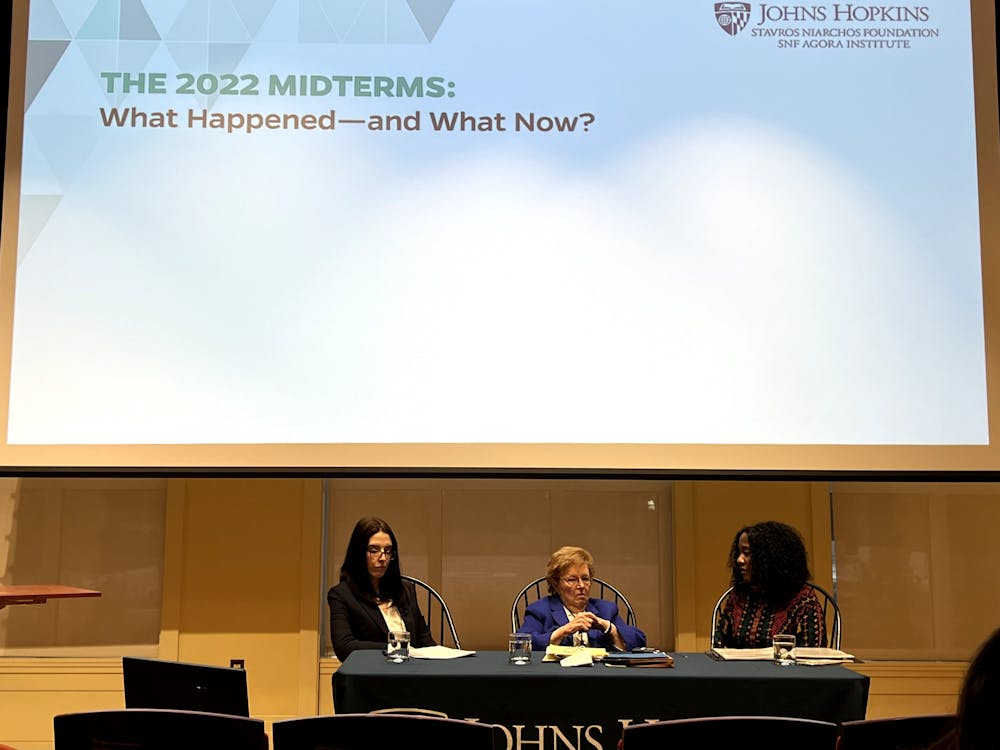The Stavros Niarchos Foundation (SNF) Agora Institute hosted a panel discussion on Nov. 14 about the recent midterm elections. The panel featured Senator Barbara Mikulski and Stephanie Young and was moderated by Louise Flavahan, SNF Agora’s dialogue and debate director.
Mikulski served as senator for Maryland from 1987 to 2017 and was a member of the Democratic Party. After retiring from the Senate, she joined the University as a professor of Public Policy and an advisor to University President Ronald J. Daniels.
Young is the executive director of When We All Vote, a non-partisan voting initiative launched by Michelle Obama in 2018.
The speakers examined the election results from last week and their implications for Congress and Biden’s agenda.
Mikulski highlighted the importance of Senator Elizabeth Warren’s win in Massachusetts for moving forward with social policies, such as the safety net, the social contract and raising the debt limit.
“It was a victory for grassroots organizing, voter turnout, and it was a victory for people who share their personal freedom, people who share democracy,“ she said. “It was not a referendum on Democrats. It was really a referendum on Donald Trump and chaos.”
According to her, by securing the majority of the seats in the Senate, the Democratic Party will start to reduce the impacts of policies introduced by former President Donald Trump.
Sophomore Jack Charboneau, who attended the discussion, shared his opinions on the midterm election results in an interview with The News-Letter.
“The Democrats really did a good job of getting away from all the Trump stuff and prevailed in the Senate. Just looking forward to 2024 really reinvigorated Joe Biden's chances,“ he said. “On the flip side, all the Trump candidates, especially the big ones in Pennsylvania and Arizona governor's race have really struggled.”
At the event, Young discussed the importance of increased participation in the midterm election, especially among young voters. She highlighted that Millennials and Generation Z combined are now the largest voting bloc in the U.S.
“Young people [unite] in such a force and at a rate that determined places like Pennsylvania and Michigan,“ she said. “Even here in Maryland, where you have the first Black elected governor.”
She attributed the increase in awareness among the younger generation to non-traditional news sources and peer-to-peer organizing.
“[Peer-to-peer organizing coupled with cultural work] means that we are on your favorite television show; we are on your favorite radio station; we are working with your favorite artists and influencers and athletes and we're reaching you at a point that you're not even thinking about politics necessarily, but we're giving you that message,” she said.
The U.S. Elections Project estimates a turnout rate of 47% for this year’s elections. 18-to-29-year-olds accounted for 12% of voters according to the exit polls.
Mikulski stressed the importance of civic engagement, stating that every issue ultimately concerns politics.
“If you're worried about politics, go to an NGO [or] get involved in making the process work, which is to volunteer [for the] boards of elections [to] make sure our elections go smoothly,” she said.
Young added to Mikulski's points about the importance of civic engagement.
“We need more people, good people running for office and going back home and fixing their own communities in our own neighborhoods,” she said.
She described the example of Maxwell Frost from Florida, who is the first member of Generation Z and the youngest elected person to serve in Congress. Frost’s campaign policies concern issues such as ending gun violence and Medicare for all.
In an interview with The News-Letter, Mikulski emphasized the power of an open conversation on promoting democracy’s progress.
“I'm always leaving open conversations about governance, the more people have their say, the more robust a democracy is,“ she said. “I believe in open, transparent [conversations] and as long as you assume that for every right there is a responsibility, so you don't slander people.”
According to her, the Constitution and the First Amendment not only ensure free speech in forums but also allow people to express their opinions via letters and op-eds to avoid retaliation.
In an email to The News-Letter, freshman Nver Saghatelyan, who attended the panel discussion, noted his new outlook on democracy from the event.
“I came to the understanding that we urgently need institutional reforms, and visionary leaders empowered to lower the stakes of political competition,“ he wrote. “Thus, I hope to access the necessary resources to contribute to institutional reforms in order to alleviate polarization in the world's greatest democracy heading to uncharted and dangerous territory.”
Saghatelyan shared that he attended the panel talk to learn about Mikulski’s vision of the depolarization of American politics. He believes that the U.S. is more dangerously divided than any other established democracy.
Young emphasized the importance of considering the long-term impacts of casting a vote.
“Elections are not instant gratification,“ she said. “They are linked in a long chain, and so every time we go to the ballot box every person that we elect today is going to do something for our future.”





